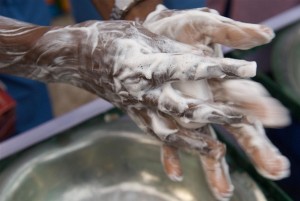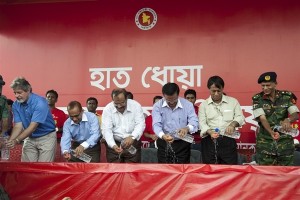全球人類齊響應「全球洗手日」2011 「清潔雙手,生命有救」
2011-10-14

紐約/香港,2011年10月14日——聯合國兒童基金會(UNICEF)明日將聯同世界各地數以億計的市民舉行第四屆「全球洗手日」運動,合力推廣用肥皂洗手這個既簡單,又有效,兼具成本效益的預防疾病方法。
各地將會舉行連串精彩活動,慶祝今年10月15日的「全球洗手日」。教師、家長、演藝名人和政府官員等各界人士,將身體力行,鼓勵大眾勤洗手,共同抵預腹瀉和急性呼吸道感染等威脅性命的疾病。
「全球洗手日」在國際間一呼百應,全球多個國家及地區都一起響應這項運動。在阿富汗,今年將會有170萬名、來自1,700所學校的兒童,浩浩蕩蕩一同洗手,而在厄立特里亞,亦會有逾32萬名來自1,272所學校的學生參與同類活動。在秘魯,當地政府更已宣佈10月10日起為「全國洗手周」,預料相關活動將得到2萬所學校共350萬名學生參與。至於在印度的拉賈斯坦邦和巴基斯坦,估計分別會有800萬及100萬名學生參加洗手活動。連同其他相關的活動,預期今年「全球洗手日」運動的規模勢必超越上年,得到全球逾70個國家,來自70萬所學校共2億人共同參與。
上述的活動,都只有同一個目標,就是宣揚「清潔雙手,生命有救」,這關乎拯救生命的信息。UNICEF估計,腹瀉和肺炎每年分別奪去110萬和120萬名兒童的生命。而在預防疾病的成效方面,用肥皂洗手比起任何單一的疫苗均來得更簡單直接、更具成本效益。只要在如廁後或處理食物前等關鍵時刻洗手,便可降低5歲以下兒童近50%的腹瀉發病率和近25%的呼吸道感染。

UNICEF個人及環境衞生高級顧問Therese Dooley指:「即使在發展中國家,肥皂都並不短缺。」她續指:「絕大部份貧困家庭都有肥皂,只是他們多使用肥皂洗衣服或洗澡,而鮮有用肥皂洗手。」Dooley女士續指,UNICEF期望用肥皂洗手,可變成所有國家的社會文化。
世界各地的政府現正將「全球洗手日」定為全國性的盛事,希望國民不只在這一天記得洗手,而是將用肥皂洗手培養成為文化,一年365日都實踐這良好習慣。以2010年為例,孟加拉全國的學校共1,800萬名兒童在10月15日進行大規模集體洗手示範,為當地政府提供了一個優越的平台,推行全國衞生運動,移風易俗,成功改變全國人民使用肥皂的習慣,加強民眾用肥皂洗手的意識。
 |
 |
關於「全球洗手日」: 10月15日是「全球洗手日」,2008年由用肥皂洗手公私伙伴組織(Global Public-Private partnership for Handwashing with Soap)發起,並獲得各地政府、國際組織、民間團體、非牟利機構、私人公司及公眾的支持。詳情請瀏覽:www.globalhandwashingday.org









